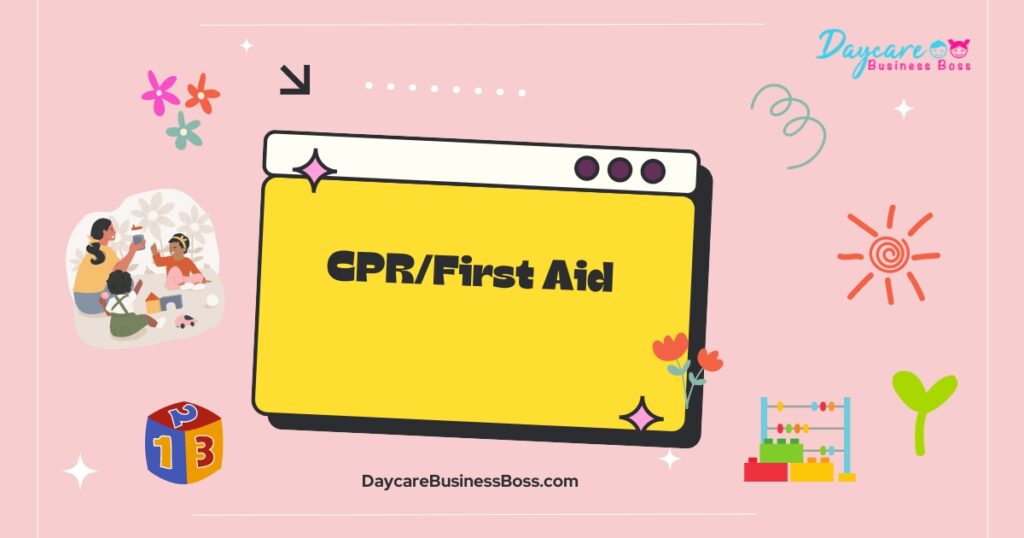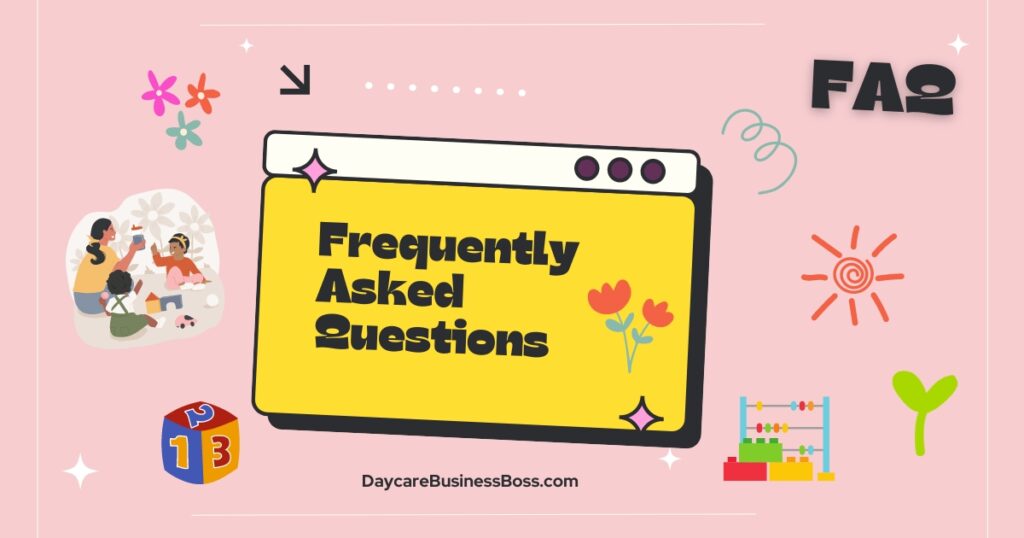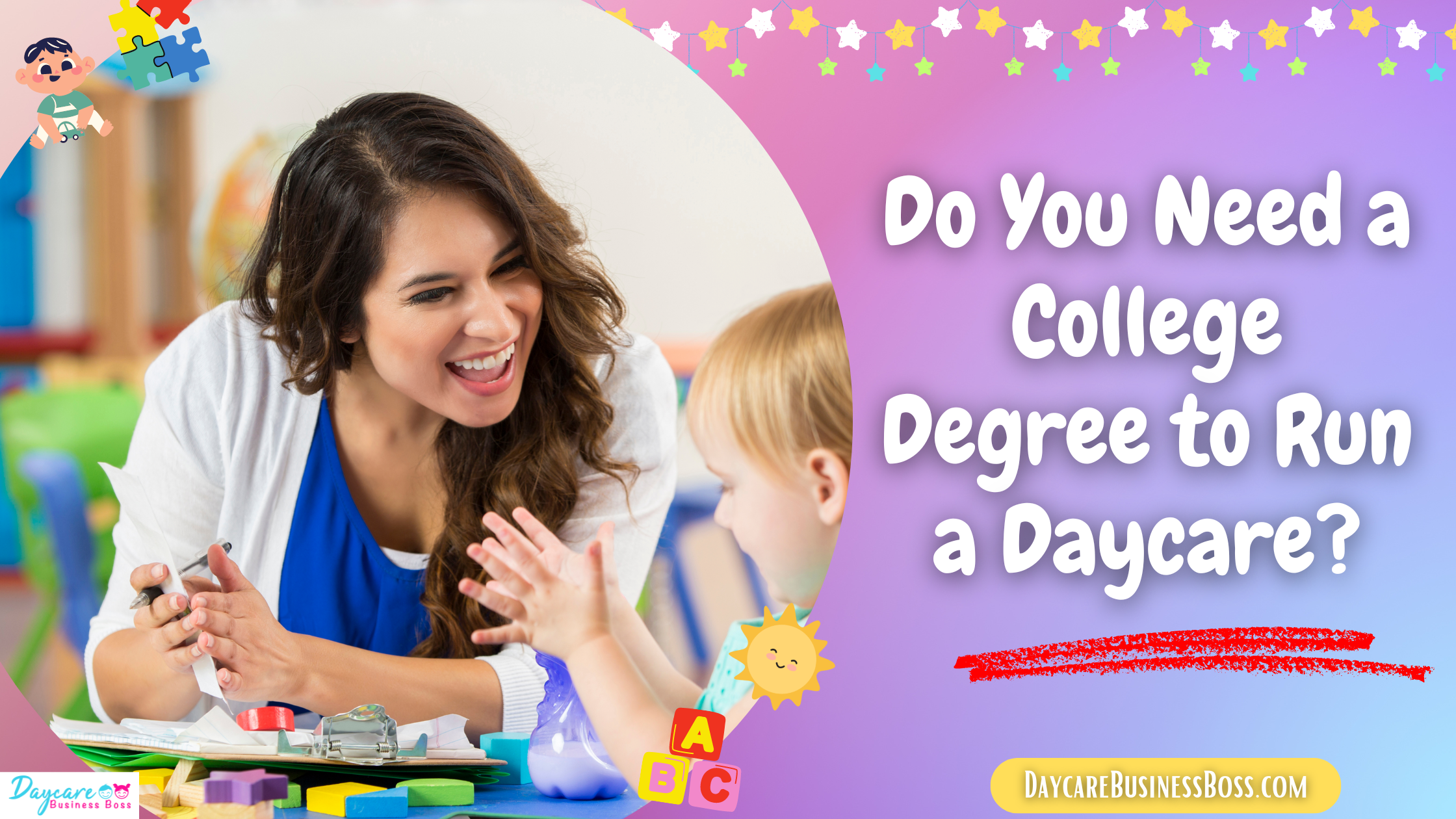Maybe it started when you met your baby brother when you were five years old. Or perhaps it was when you babysat the neighbor’s daughter in high school. Whatever the case, somewhere along the way, you fell in love with kids and decided you want to run your own daycare! The thought of impacting little hearts and minds makes you jump for joy and you want to get started right away! But wait…what about a college degree?
Do you really need a college degree to start a daycare? The minimum requirement to open a daycare is a high school GED. That said, further licensing, certifications, and even traditional degrees can have a huge impact on the success of your business and the care that you provide your clients with. If you choose not to pursue a degree, you will need years of experience and comparable certifications to prove to your clients that you are capable of running a safe and successful daycare.
Though it may seem like a lot of time, money, and effort, degrees and certifications will pay off in the long run. And they don’t have to be as intimidating as they sound. There are many certifications and courses available that will prepare you for the world of early childhood education. Let’s take a look at what these certifications have to offer and how to get them.
Why degrees & certifications will benefit your daycare
Now, before you check GED off the list and start looking for locations for your new daycare, let’s consider why a degree or certification might be helpful in this new venture. Put yourself in the parent’s shoes: their child is the most important person in their world. They are entrusting you not only with their safety and care but with molding their young minds and attitudes and teaching them about the world. If I was a parent, I would be very picky about who I let have that responsibility in my child’s life. A degree in Early Childhood Development or certifications in child care will go a long way in reassuring parents (your potential customers) that you are the best person to care for their precious baby! Ultimately, you want to win their trust so they will pick your daycare for their child. They need to have confidence that you know what you are doing.
But it’s not just the parents who benefit – you do as well! Having a degree or certifications will give you the confidence you need to navigate all the facets of early childhood care. From infants to early school-age, you must meet a wide variety of physical, emotional, and mental needs. You must comply with federal and state regulations. You must manage a building facility and other childcare workers. You will be responsible for all of it, so it is best to get all the information, training, and preparation you can! The benefit of a degree or certification is not just the piece of paper that you hang on your office wall, but the experience of being trained by other professionals who have had years of experience in this field. They become a valuable resource for you long after the training is complete. When you face a difficult circumstance or are unsure of how to handle a situation, you have mentors and teachers to call who can guide you along the way.
A third reason to consider pursuing certification is that it will give you the necessary tools to create a thriving business. After all, you want your daycare to be successful and profitable so you can continue to invest in young children! Rather than learn everything by trial and error, why not benefit from those who have gone before? A business owner who is educated or certified in their field has a huge competitive advantage to those who are not. It can impact the prices you set, the types of programs or initiatives you install, and the perception your daycare will have in the public eye. Maintaining professionalism is not just for your own confidence, it’s a smart business move and one that you can market. Advertising your credentials will set you a step ahead of the other daycares in your area.
Recommended Certifications
There are many types of classes and certifications that would be helpful on your daycare journey. Some only require a few hours of online training, others are more extensive, but also more widely recognized. Let’s look at three of the most recommended certifications:
CPR/First Aid

This may seem like a no-brainer, but it is worth stating. When caring for babies and small children it is important to be certified in these life-saving skills. The Red Cross offers a variety of training classes. Emergency situations can come even with the best supervision in place so it is best to be prepared for the worst! Most states require this in order to obtain a daycare license. If your facility will be near water or have a swimming pool, you will want to consider lifeguard training or water safety training, as well.
A Child Development Associate Credential (CDA) license
This is the most widely recognized license in the world of early childhood education. This certification is available for both center-based and family child care. This certification focuses on competency standards across eight subject areas. When these best practices are implemented they will greatly benefit the children and caregivers alike. There are several requirements for application for a CDA license:
- A GED (or be enrolled as a junior or senior in high school)
- Completed 120 hours of formal early childhood education training
- Obtained 480 hours of work experience in the previous 3 years
If you meet these requirements the next steps involve preparing a portfolio to showcase your work in the field of early childhood education and finding a CDA professional development specialist for a verification visit. There is a small fee to apply online and once your portfolio and application is reviewed, you will meet with your PD specialist and take an exam. The Council for Professional Recognition will review your results and certify that you met the requirements. As this is a nationally recognized certification, it will be very helpful in proving your credibility in the world of early childhood education.
Next Steps: Search for training organizations to complete the 120 hours requirement, find a PD Specialist to verify the training you have done, apply for the CDA exam.
A Certified Childcare Professional (CCP) credential
This credential is awarded by the National Early Childhood Program Accreditation (NECPA) Commission, Inc. to individuals who have teaching experience. Like the CDA license, the CCP also requires a GED, prior work experience, and an exam. This certification is helpful for teachers who have not yet completed a college degree or who are transferring from another field of work or study. A benefit to this credential is that it is also recognized nationally as a mark of professional expertise in the early childhood education field.
Requirements for application include:
- A High School diploma or GED
- At least 720 hours of child care experience
- At least 180 hours of education/training in nine different focus areas
- An exam
- A professional development portfolio
- Two parent evaluations
- Two letters of endorsement
- Two writing samples
- Plans for continued professional development
This thorough screening allows the certificate to carry weight: it is a highly respected credential that will set you apart from other daycare owners.
Next Steps: Enroll with the Certified Childcare Professional Program.
Related Questions

What degree should I get if I want to open a daycare?
After reading all this you may decide pursuing a traditional college degree or associate degree is the best path for you after all! Formal education provides you with access to professors and mentors with years of field experience who can set you on a path for success. A degree builds confidence with your clients and prepares you for many different aspects of child care. Most people who want to work in a daycare setting get a degree in Early Childhood Education or Elementary Education.
Are there other options for earning a degree besides a traditional four-year degree plan?
If the thought of getting a formal degree is intimidating to you, don’t let that scare you away! There are many avenues available for earning a degree in early childhood education. Many community colleges offer associate degrees in this field that are typically 2-3 year programs. There is also a wide selection of online degrees that could be completed in conjunction with work experience. Just because you may not live near a university or college does not mean you cannot have access to this valuable education. An associate’s degree or online degree programs can often be less expensive than the traditional approach. These allow flexibility so you can work (gaining valuable experience and work hours) while also advancing your education.
Please note: This blog post is for educational purposes only and does not constitute legal advice. Please consult a legal expert to address your specific needs.
Ready to start planning your daycare business now? Why not take a look at our startup documents to help you get going?

Meet Shawn Chun: Entrepreneur and Childcare Business Fan.
I’m a happy individual who happens to be an entrepreneur. I have owned several types of businesses in my life from a coffee shop to an import and export business to an online review business plus a few more and now I create online daycare business resources for those interested in starting new ventures. It’s demanding work but I love it. I do it for those passionate about their business and their goals. That’s why when I meet a childcare business owner, I see myself. I know how hard the struggle is to retain clients, find good employees and keep the business growing all while trying to stay competitive.
That’s why I created Daycare Business Boss: I want to help childcare business owners like you build a thriving business that brings you endless joy and supports your ideal lifestyle.


3 thoughts on “Do You Need a College Degree to Run a Daycare?”
Comments are closed.